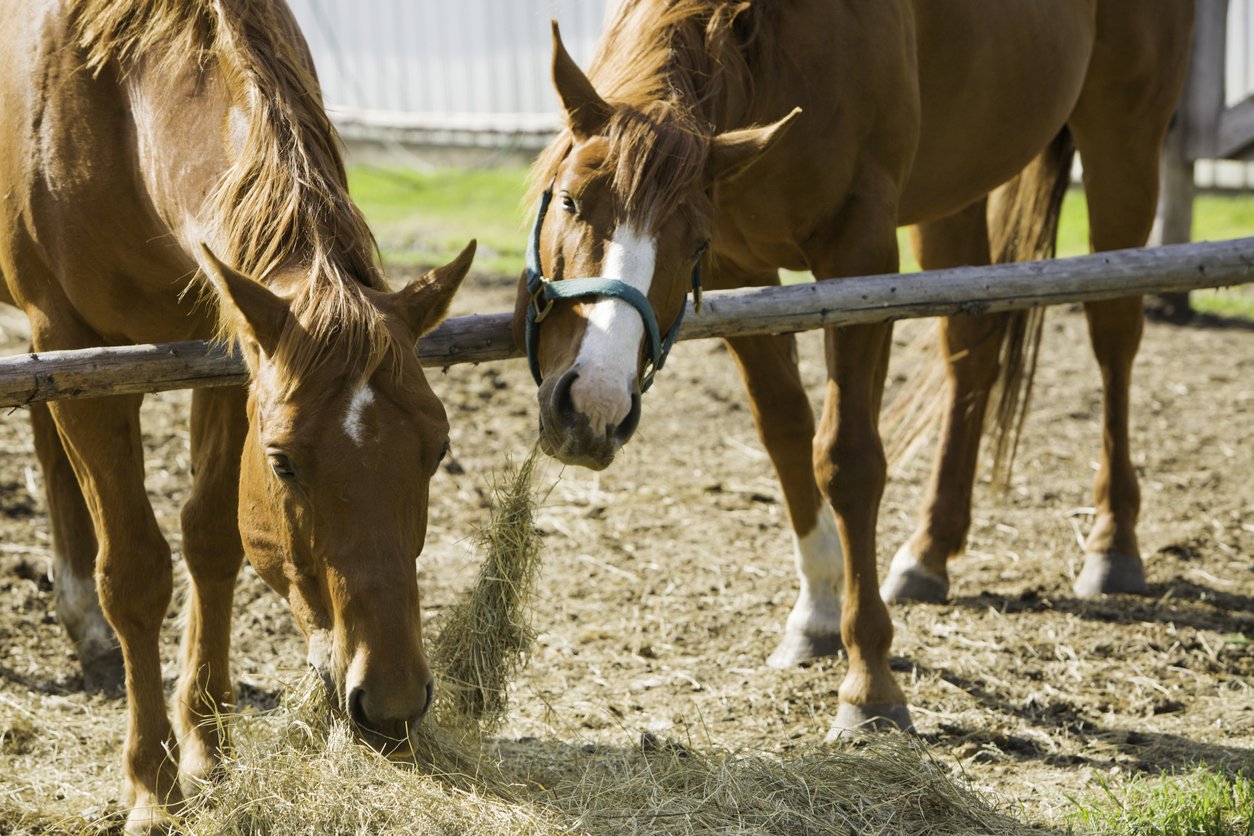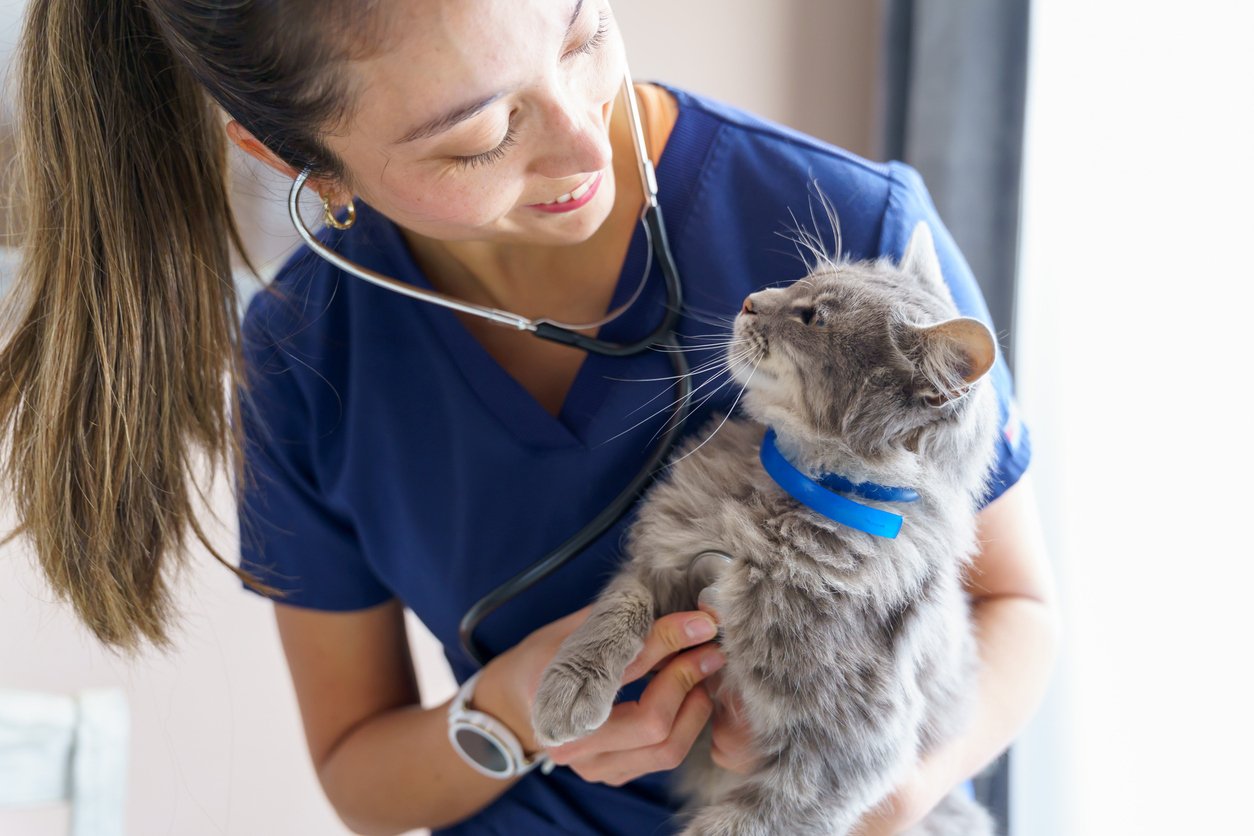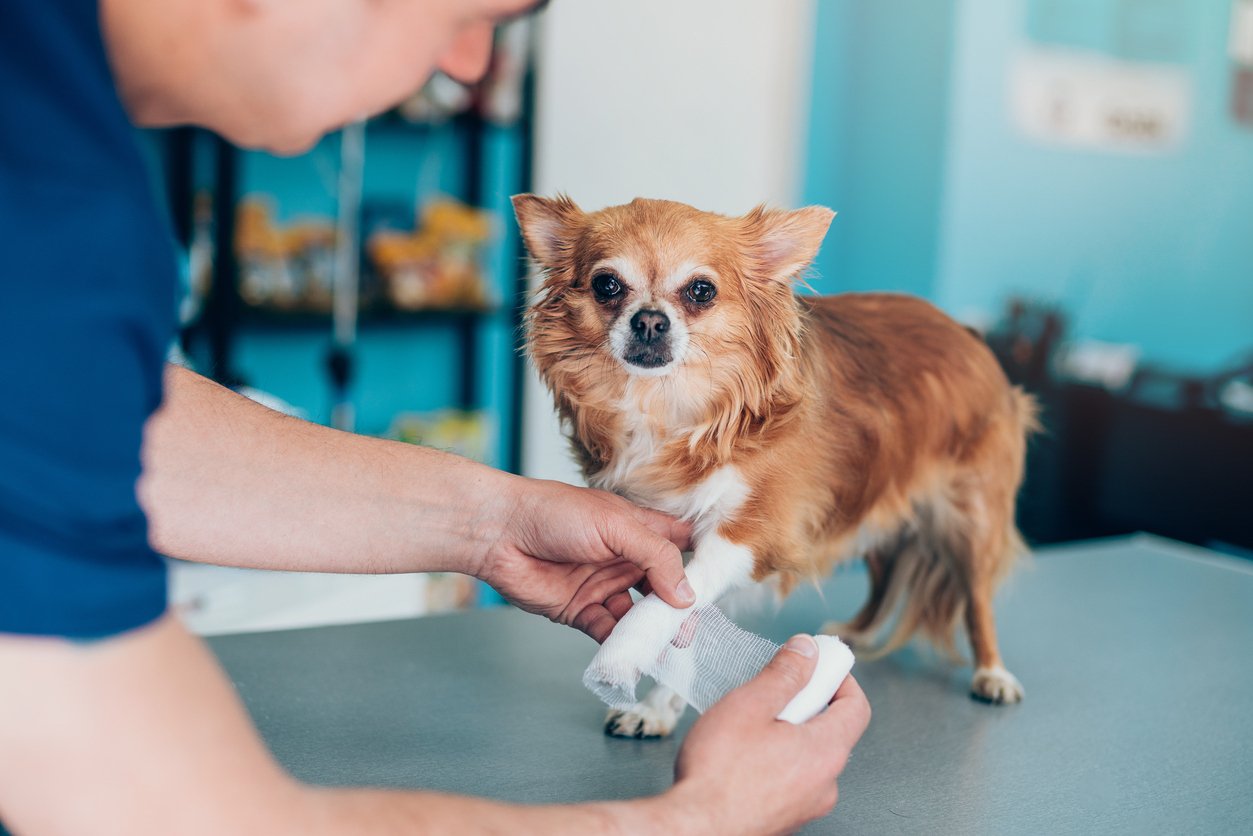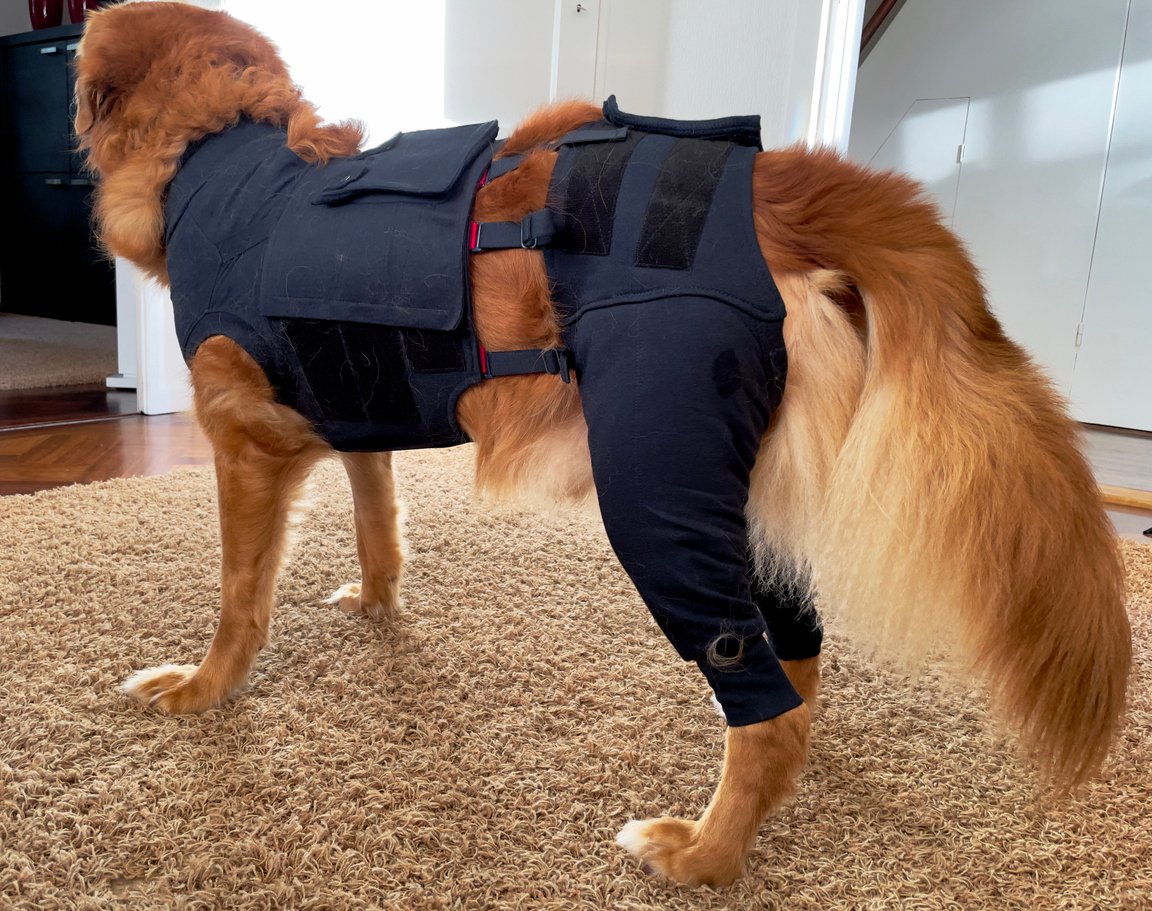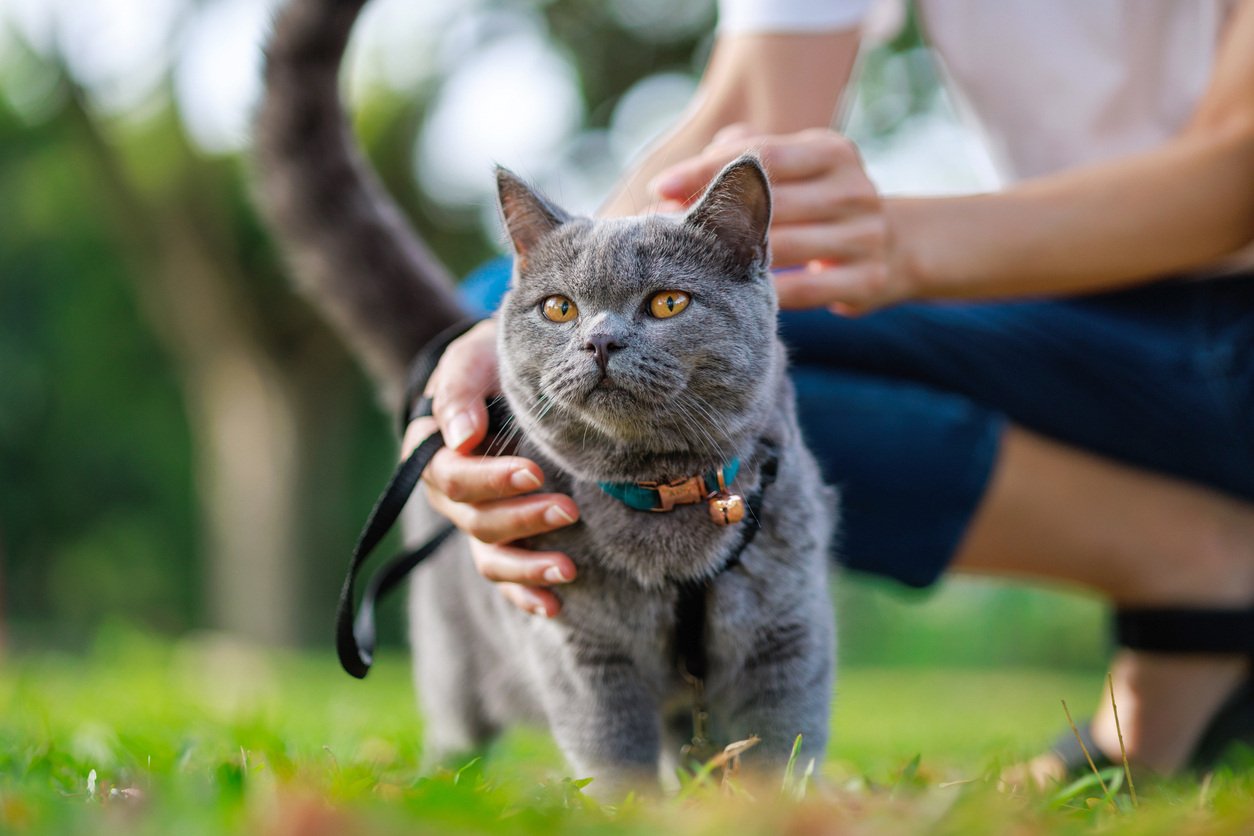Table of Contents
Hay, when was the last time you thought about what you’re feeding your horse?
If you haven’t considered equine nutrition in a while, it’s probably a good time to do some reading. Whether you have a performance horse or a domestic horse, you want to make sure you’re feeding him the most nutritious diet possible.
So what do the best nutrition pros recommend when putting together a feeding plan for your horse?
You’re about to find out.
In this post, we’ll cover the basics of equine nutrition, including the benefits of feeding your horse a maximally healthy diet.
So you can stop feeling saddled with guilt that your horse isn’t getting all the nutrients he needs.
Ready? Then let’s get to the “mane” event and learn about equine nutrition!
Intro to Equine Nutrition and Feeding
An easy way to maintain superior horse health is to ensure that you’re feeding your horse everything he needs to thrive.
So, how do you do that?
Fortunately, horses receive many vital nutrients, like vitamins, minerals, and fibre, by grazing on forage, like grass and hay, for many hours of the day.
But in addition to forage, some equestrians supplement their horse’s food with grains, such as oats and barley. Just keep in mind that too much grain can be dangerous for your horse, so proceed with caution if you go this route.
It may also be helpful to remember that your horse has two main parts to his digestive tract:
- Foregut
- Hindgut
These parts of the digestive tract accomplish different tasks to help your horse digest all the food it eats. The table below shows how this works.
| Part of Digestive Tract | Organs Involved | Digestive Process |
| Foregut | Made up of the stomach and small intestine | Uses enzymes to digest and absorb nutrients like starches, vitamins, fats, and minerals. |
| Hindgut | Made up of the cecum, large colon, small colon, and rectum | Uses microbes (like bacteria) to digest the fibre that is in horse roughage. |
Basic Equine Nutrition
Your horse has to receive key nutrients from his food to thrive.
Crazy, huh?
And one of the main ways he can do so is by grazing in a nutrient-rich pasture. That’s because forage is where your horse gets sugars and starches, which provide energy.
Letting your horse graze in a pasture is helpful because horses have to eat… almost constantly. In fact, your horse should eat about 1% of his body weight a day in forage.
To put that into perspective, if you have a 2,000-pound horse, that means he needs to eat about 20 pounds of forage a day!
Unfortunately, grass and hay don’t always provide all the nutrients that a horse needs. So some equestrians choose to feed their horse forage that’s been supplemented with the right mix of vitamins and minerals.
5 Benefits of Balanced Equine Nutrition
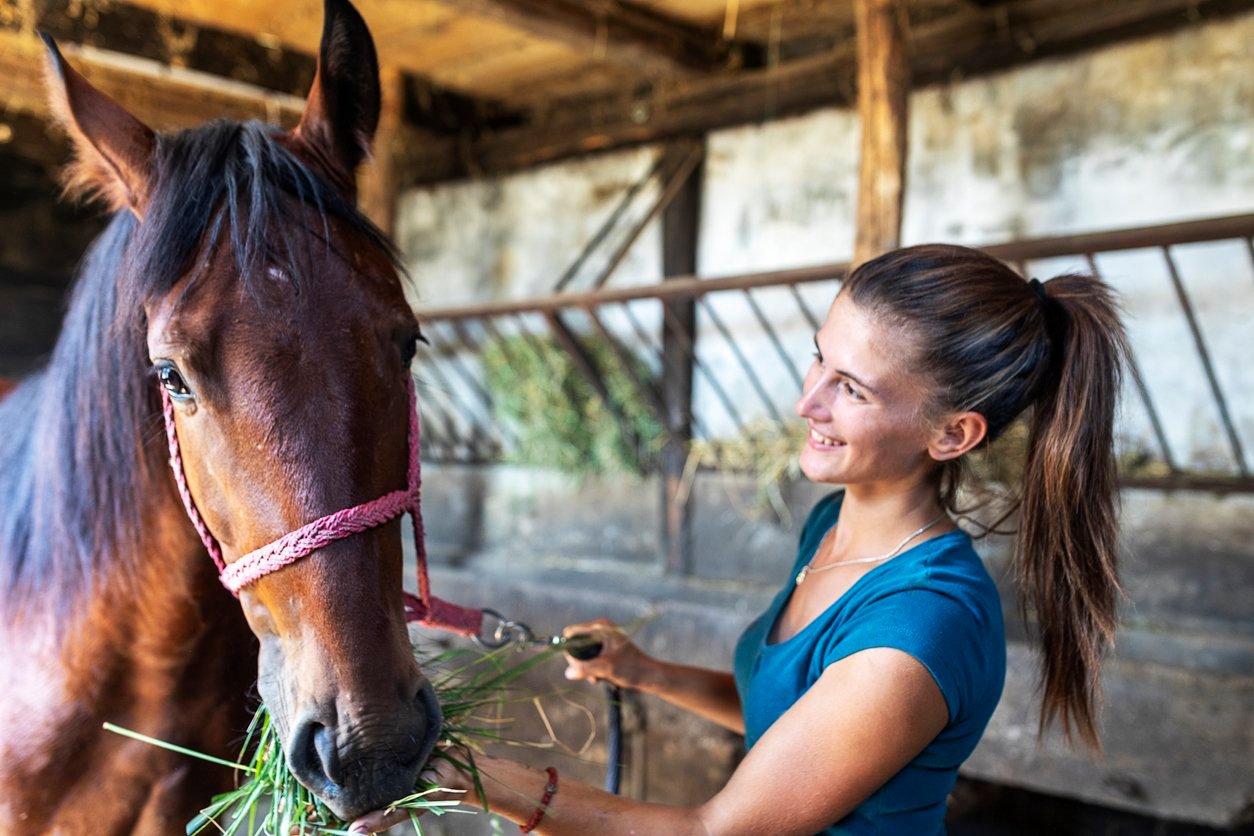
Now that we’ve covered the basics of equine nutrition and feeding, let’s get more specific about some of the benefits of a balanced diet.
1. Better Sports Performance
It’s no wonder that you need to pay special attention to your sport horse’s nutrition.
Performance horses need more energy than domestic horses. That’s because they work harder, whether trying to master a jump or place first at the next race.
As a result, many equestrians turn to grain as an extra energy source. But too much grain can be really dangerous for your horse. We’ll talk more about this soon!
Paying close attention to what you feed your horse can prevent him from developing conditions like colic, which can leave him stuck at the starting line before even hearing the word “go.”
In particular, a sport horse needs the following components of a properly balanced diet to compete at maximum ability.
- Plenty of water and electrolytes
- Carbohydrates, fats, and proteins for energy (but mostly carbs and fats!)
- Sufficient levels of vitamins and minerals
Without these things, your horse won’t stand a chance against his competition.
2. Fewer Injuries
Proper equine nutrition also allows your horse to build strong bones, horse muscles, and connective tissues (like ligaments and tendons).
And this helps reduce the risk of injury.
For example, ensuring that your horse is getting enough Vitamin B, which is prevalent in fresh grass, helps maintain the health of your horse’s red blood cells.
So, why is that important?
Because red blood cells carry oxygen, and without enough oxygen, your horse might get some pretty severe muscle cramping.
Which is the last thing you want when you’re riding your horse!
And there’s more. If your horse is already injured, feeding him more protein than normal, such as through alfalfa hay or ground flax, can help support recovery. That’s because injured horses require about 25% more protein than normal.
3. Healthy Hooves (and Hair!)
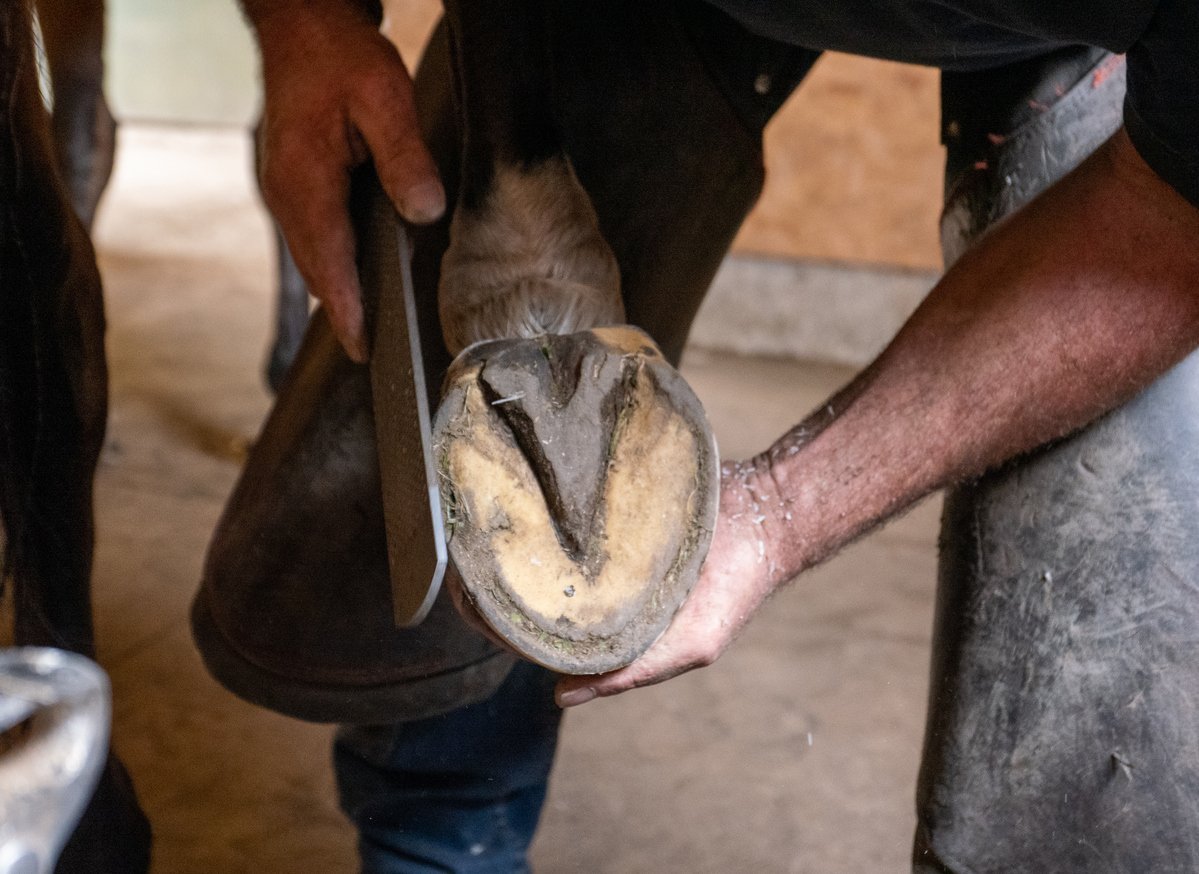
This next point is especially relevant if you happen to have a show horse.
Proper equine nutrition goes a long way in supporting the health and appearance of your horse’s hooves, skin, hair, and mane.
And if you have a performance horse, you want to ensure his hooves are top-notch. Running with cracked hooves is a recipe for disaster.
The key thing you want to think about here is keratin, which is a protein found in hooves and hair.
To support keratin development, you have to make sure that your horse is getting the right blend of amino acids, which are the building blocks of protein.
In particular, the amino acids listed below are vital to keratin production:
- Cysteine
- Alanine
- Leucine
- Arginine
Many of these amino acids, as well as key vitamins like biotin and niacin, are found in forage.
And if your horse happens to be deficient in certain amino acids, adding whey protein or fishmeal to their food can be a good way to supplement their diet. Just be sure to check in with your equine vet before doing so to make sure this option is right for your horse.
4. Rarely Sick
Another great thing about balanced equine nutrition is that it reduces the time your horse spends being sick.
Which means you have more time for training.
There are certain vitamins and minerals in particular that maintain the health of your horse’s immune system:
- Vitamin A
- Vitamin C
- Vitamin E
- Selenium
Selenium and Vitamin E are both antioxidants and Vitamin A improves the health of white blood cells, which can help your horse’s body stave off infection. Vitamin C is another antioxidant that can help boost your horse’s immunity.
The best way to provide these nutrients to your horse is by giving him fresh, nutrient-rich or supplemented hay.
5. Proper Weight
The last thing you want is an overweight horse. And not just because it means you’re spending too much money on extra food!
Being overweight is bad for your horse because it leaves him prone to developing lots of health conditions, from arthritis to suspensory ligament injuries.
If your horse is consuming too many calories (often from grain!), then he may become overweight.
But thinking carefully about equine nutrition can help combat weight gain, or help your horse lose weight if he’s already a bit chunky.
In particular, make sure you’re feeding your horse the right ratio of forage to grains. That’s because while grain may be a good source of energy, the added calories can be too much for horses that aren’t getting proper exercise.
Additionally, exercise can help prevent your horse from gaining weight, whether you’re letting him walk your pasture or taking him out riding.
5 Equine Nutrition Pro Tips
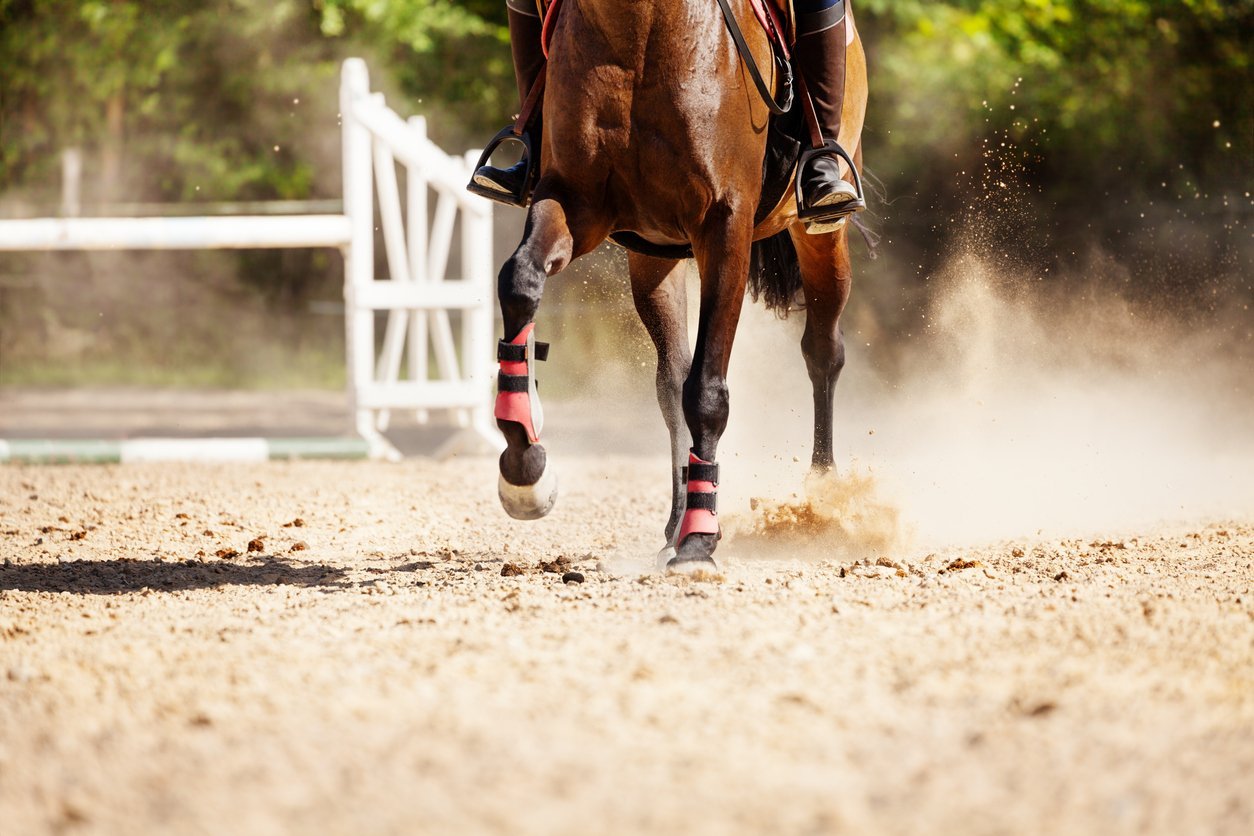
1. Feed Equine Joint Supplements
Proper equine nutrition keeps your horse’s joints healthy and helps him avoid a variety of health conditions, from arthritis to suspensory ligament injuries.
And certain active ingredients found in joint supplements, like glucosamine for horses, can take your horse’s joint health to the next level.
A good joint supplement helps maintain the health of cartilage in your horse’s joints, as well as the tendons and ligaments that connect muscle to bone and bone to bone. This allows your horse to get up to all his favourite activities without fear of injury.
In particular, you want your joint supplement to contain the following ingredients:
- Glucosamine: repairs damaged cartilage
- Chondroitin: prevents further cartilage deterioration
- MSM: antioxidant that reduces pain and inflammation
- Hyaluronic acid: lubricates joints
And when you’re first learning how to read a supplement label, always try to find a supplement that has as little filler as possible. This ensures you’re not just feeding your horse a glorified treat, but rather something that will boost his health.
As you might guess, we’re particularly fond of Integricare’s TRI-ACTA H.A. and TRI-ACTA as great supplement options.
If you’re looking for some basic joint maintenance for a healthy horse, TRI-ACTA is going to be your best bet, as it contains glucosamine, chondroitin, and MSM for joint health… plus, no fillers.
For performance horses, our maximum strength sister product, TRI-ACTA H.A., may be more in line with your needs. It contains higher dosages of the active ingredients, as well as the addition of hyaluronic acid for joint lubrication.
2. Provide Plenty of Water
Water is vital to proper equine nutrition. Without sufficient intake of water, your horse may become dehydrated or get colic.
Which I’m sure we all want to avoid, no?
When you’re spending time with your horse, be on the lookout for the following symptoms of a dehydrated horse:
- Stiffness
- Skin doesn’t “bounce back” when you pinch it
- Lethargy
- Dry upper lips/mucous membrane
And to avoid dehydration in the first place, make sure your horse always has access to plenty of water.
Keep in mind that some horses will require more water than others. Performance horses who are regularly competing or exercising, for example, should drink 10 to 18 gallons (or more!) of water a day.
Similarly, if you’re in a particularly warm climate, you’ll need to make sure your horse is getting more water.
Due to the sweating that often occurs alongside exercise and heat, you may also want to provide your horse with a salt lick to replenish the electrolytes he loses from sweating.
3. Monitor for Nutritional Deficiencies
Fortunately, most of the time your horse can get all the nutrients he needs from a balanced diet.
But sometimes your horse may become deficient in a vitamin or mineral, which can cause issues such as muscle weakness, anemia, dull coat, weakness, weight loss, and more. The symptoms of a nutritional deficiency will largely depend on what he’s deficient in.
And some horses are more likely to become deficient in vitamins and minerals than others:
- Horses that eat an all-hay diet
- Pregnant horses
- Horses eating from nutrient-deficient soil
- Performance horses
But that doesn’t mean you should be rushing to feed your horse a supplement right away. That’s because you should only ever feed your horse a vitamin supplement if he’s deficient, as too much of certain vitamins and minerals can be toxic for your horse.
Your equine vet can help you determine whether your horse is deficient in any nutrients and direct you to the best way to remedy the deficiency.
4. Exercise Regularly
So you might be thinking, “What does exercise have to do with nutrition?”
We get that it seems unrelated.
But regular exercise is just as important to basic equine nutrition as eating a proper mix of foods.
Or at least, that’s what several studies have shown, including one study conducted on Standardbred horses.
That’s because getting enough exercise helps with digestion. This increases your horse’s ability to obtain energy and nutrients from the food you’re feeding him.
So whether you have a performance horse or a domestic horse, getting your horse out and about with exercise is a key way to make sure all that expensive feed isn’t going to waste.
Some ways you can exercise your horse are:
- Taking him for a walk (if you have a domestic or senior horse)
- Giving him free rein of the pasture
- Going riding with him
The key is to not push your horse too hard and gradually introduce exercise if your horse has been sedentary for a while.
And always make sure to warm up before you exercise!
5. Feed Fewer Grains
Lots of equestrians think their horse must have grain to meet their caloric needs.
Which can be true…
…But it isn’t always.
If you have a performance horse, energy-rich grains can help meet your horse’s caloric needs; however, if you aren’t careful, too much grain can be very dangerous for your horse.
That’s because too much grain can cause digestive issues. Remember when we mentioned that horses have two main parts of their digestive system, the foregut and the hindgut?
Well, too much grain can force your horse’s body to digest food partially in the foregut, and partially in the hindgut.
Because the hindgut relies on bacteria to digest foods, rather than enzymes as in the foregut, your horse’s body ends up producing a lot of gas. This can cause your horse severe gastrointestinal pain (colic), stomach ulcers, and even laminitis.
So, if you must feed your horse grain, try to break up the servings throughout the day. That way, you’re never feeding your horse an entire day’s amount at one time.
3 Equine Supplements
It can be hard to choose the right supplement for horses, so we’ve put together a list of our top three picks to make things easier for you. Because we’re awesome like that.
1. Integricare’s TRI-ACTA
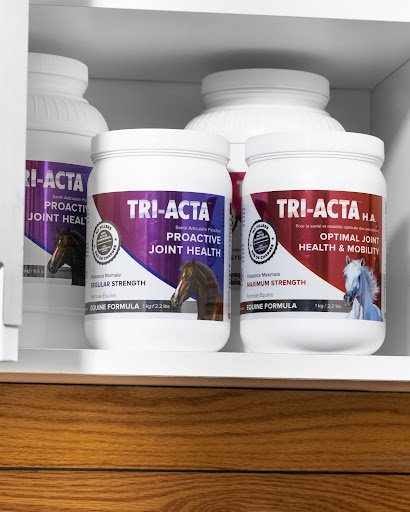
First up on our list when it comes to equine nutrition are our two favourite products: TRI-ACTA for Equine and TRI-ACTA H.A. for Equine.
We know… a bit self-promotional, isn’t it?
But before you roll your eyes, let us explain.
First and foremost, our products don’t contain fillers. That’s right: nada. This means that each dollar you spend goes towards quality ingredients that will benefit your horse.
So, what’s the main difference between the two supplements?
Well, each supplement contains glucosamine, chondroitin, and MSM to help rebuild and prevent cartilage deterioration, as well as reduce pain and inflammation.
And TRI-ACTA H.A. contains the addition of hyaluronic acid, which aids in synovial fluid production to lubricate joints. It’s also the highest all-active key ingredient formula on the market. Not too shabby.
But don’t let that dissuade you from trying its sister product, TRI-ACTA for Equine, which still contains high levels of glucosamine, chondroitin, and MSM, and is a great option for domestic horses.
TRI-ACTA price $89.99 to $259.99 as of September 2021
TRI-ACTA H.A. price $129.99 to $369.99 as of September 2021
| Supplement | Characteristics |
| TRI-ACTA |
|
| TRI-ACTA H.A. |
|
2. Ani-Motion Natural Botanical Blend
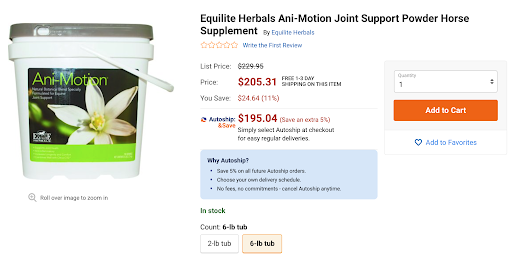
Ani-Motional Natural Botanical Blend is a great option if you’re looking for a supplement made from herbal ingredients.
This supplement contains a blend of devil’s claw, yucca, chamomile, turmeric, and rose hips to promote equine nutrition.
In particular, devil’s claw and yucca help promote joint health and minimize stiffness and pain. Additionally, yucca can improve the look and feel of your horse’s mane and tail.
Of course, if you’re looking for something with more “punch,” one of the TRI-ACTA supplements we discussed above may be best. But this is a great natural option for domestic horses.
Price $83.98 to $205.81 as of September 2021
3. Grand Meadows Grand Flex Senior
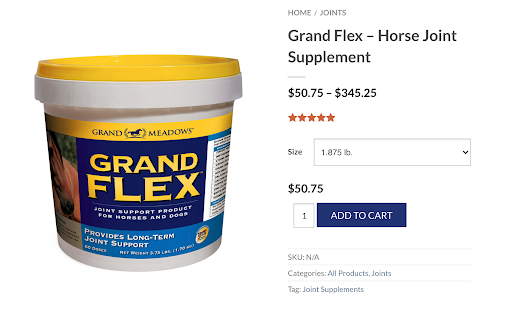
And finally, we can’t forget about our seniors when discussing equine nutrition! Third on our list is Grand Meadows Grand Flex, which is a great option for senior horses.
In particular, this supplement contains a boatload of MSM (10,000 mg per serving) which can help minimize the pain and stiffness your older horse may experience as he ages.
And it also contains devil’s claw and yucca, those herbal ingredients we discussed earlier, to help promote joint health.
Price $50.75 to $346.25 as of September 2021
Equine Nutrition Success Stories
We don’t know about you, but we love to celebrate. And our joint supplements are a great way to promote equine nutrition success!
One of the things we especially love about our product is its ability to improve the health and well-being of senior horses. Take this review we found discussing the benefits of one of our equine joint supplements, for example:
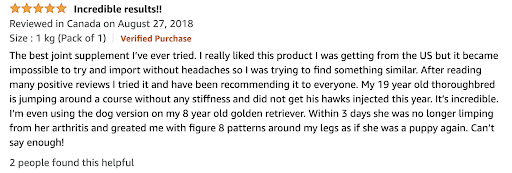
Our supplements were able to get a 19-year old horse back to frolicking about without any pain and stiffness. That’s a huge win in our book!
The long and short of it is that joint supplements go a long way towards promoting equine nutrition. We hope you’ll give them a try, too!
Common Equine Nutrition Questions
What are the five nutritional requirements for hoses?
Like all other animals, horses require six nutrients: vitamins, minerals, protein, fats, water, and carbohydrates. Of course, a horse requires these nutrients in different amounts and ratios to other animals.
What is the best protein for horses?
Whey protein is a great protein for horses due to its high levels of essential amino acids, which are the building blocks of protein. The amino acids available in whey protein are well-aligned with your horse’s protein needs.
What is the best grain for horses?
While you should try to reduce the amount of grain your horse eats as much as possible, some grains are better for your equine pal than others. In particular, oats are a great option due to their high fibre content, which makes it more challenging for your horse to accidentally overeat and get colic.
Final Thoughts
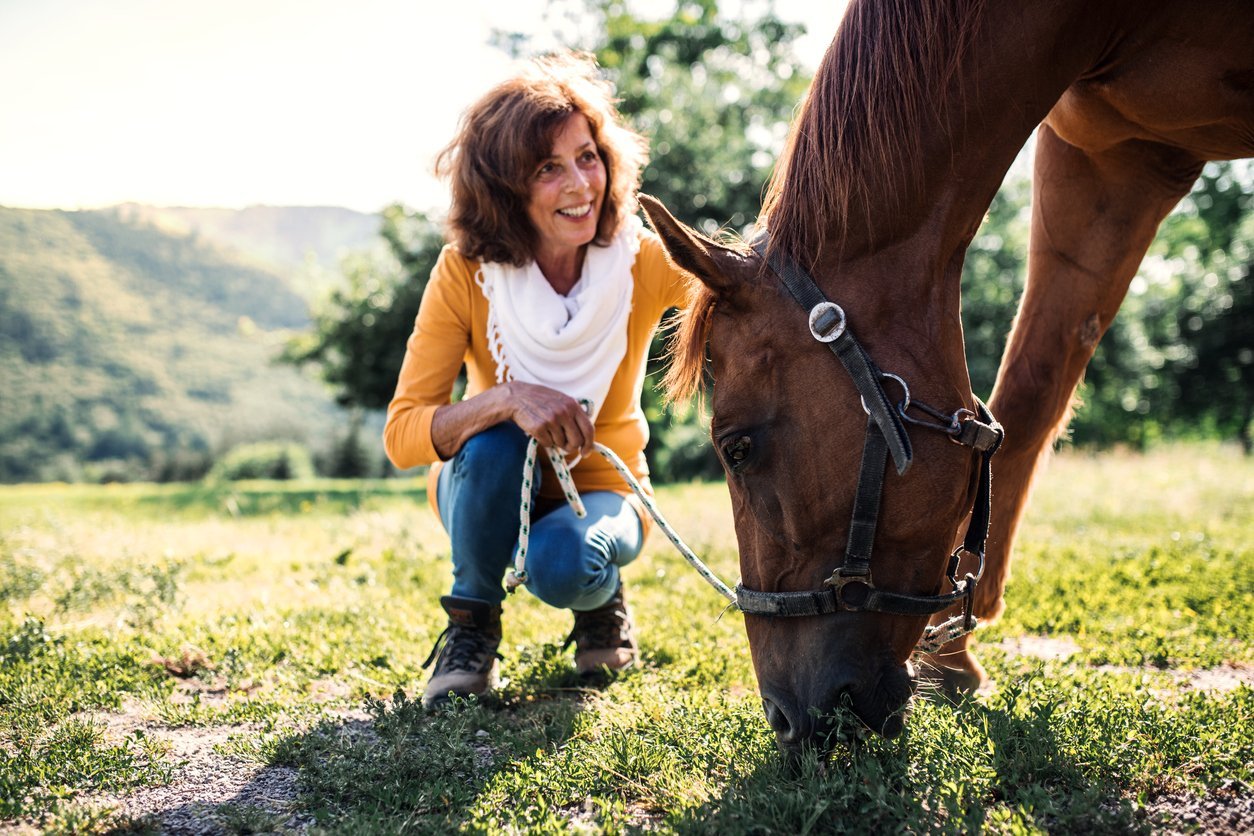
There are a few key things to remember when trying to identify the most nutritious diet possible for your horse.
In addition to providing plenty of high-quality forage and freshwater, you want to ensure your horse isn’t getting too many grains.
And getting plenty of exercise is a great way to facilitate digestion.
But our #1 pro tip is to feed your horse a joint supplement, such as Integricare’s TRI-ACTA and TRI-ACTA H.A. for Equine.
So if you’re ready to take that next stride towards balanced equine nutrition, you can find out where to buy these supplements on our website.
Newsletter Signup
Subscribe to our newsletter to receive the latest news and exclusive offers.
.jpg?height=2000&name=Cliick_Integricare-DISPLAY-REVISEDV2%20(1).jpg)
Proactive & Therapeutic Joint Supplements
When given daily, Integricare joint supplements recover bone and joint injuries faster and help prevent mobility injuries from happening in the first place.

